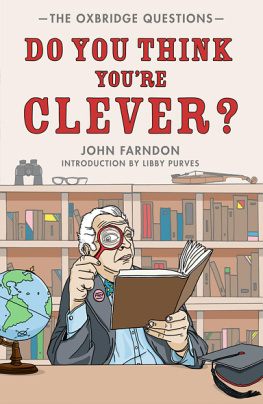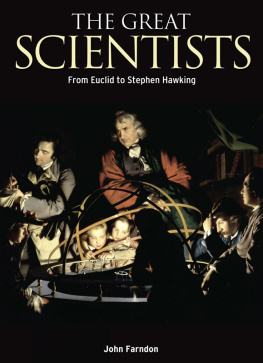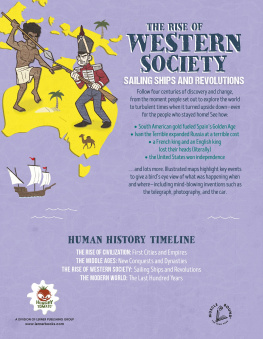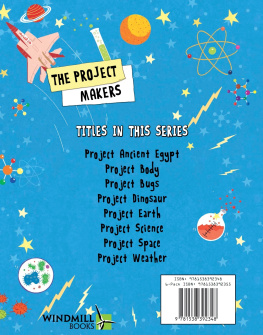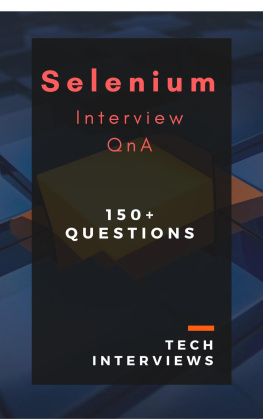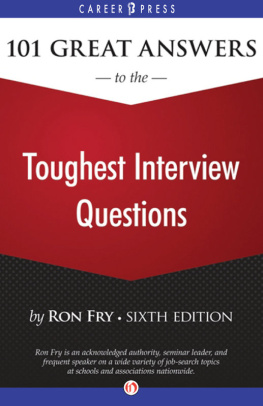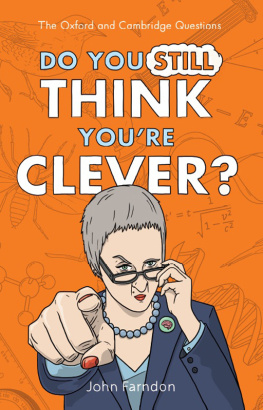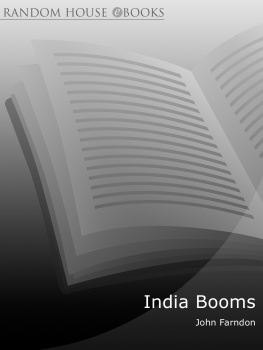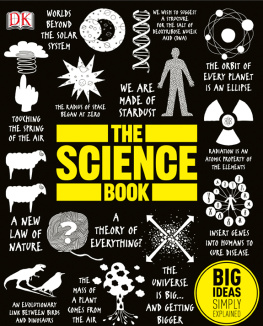DO YOU THINK YOURE CLEVER?
John Farndon, a graduate of Jesus College, Cambridge, is the author of many books on contemporary issues, including China Rises and India Booms (Virgin), and Bird Flu and Iran in the Everything You Need to Know series (Icon). He also writes widely for children, including the bestselling Do Not Open (Dorling Kindersley), and has been shortlisted four times for the Junior Science Book Prize.
www.john-farndon-books.co.uk
Libby Purves OBE is a radio presenter, journalist and author. Best known for presenting BBC Radio Fours Midweek, she also writes regularly for The Times and has published twelve novels. She is a graduate of St Annes College, Oxford, with a First in English Language and Literature.
THE OXBRIDGE QUESTIONS
DO YOU THINK YOURE CLEVER?
JOHN FARNDON
INTRODUCTION BY LIBBY PURVES

ICON BOOKS
Published in the UK in 2009 by
Icon Books Ltd, Omnibus Business Centre,
3941 North Road, London N7 9DP
email:
www.iconbooks.co.uk
This electronic edition published in 2009 by Icon Books
ISBN: 978-1-84831-156-5 (ePub format)
ISBN: 978-1-84831-157-2 (Adobe ebook format)
Printed edition (ISBN: 978-1-84831-083-4)
Sold in the UK, Europe, South Africa and Asia
by Faber & Faber Ltd, Bloomsbury House,
7477 Great Russell Street, London WC1B 3DA
or their agents
Distributed in the UK, Europe, South Africa and Asia
by TBS Ltd, TBS Distribution Centre, Colchester Road,
Frating Green, Colchester CO7 7DW
Published in Australia in 2009
by Allen & Unwin Pty Ltd,
PO Box 8500, 83 Alexander Street,
Crows Nest, NSW 2065
Distributed in Canada by
Penguin Books Canada,
90 Eglinton Avenue East, Suite 700,
Toronto, Ontario M4P 2YE
Text copyright 2009 John Farndon
The author has asserted his moral rights.
No part of this book may be reproduced in any form, or by any
means, without prior permission in writing from the publisher.
Typeset by Marie Doherty
Introduction
by Libby Purves
When you ask someone questions, especially in an interview whose outcome matters, you are checking up on two things. One is the persons knowledge simple enough to gauge but the other is more nebulous. You want to know how they think: what sort of engine their mind is, whether it runs neatly on logical rails, or soars high above every topic with the eyes of an eagle. Or perhaps, whether it just hops about like a drunken bunny-rabbit (my own modus operandi, all too often). Whether youre going to teach that candidate at a university or offer them a job, you need to know this. You need to get a sense of how they approach the unexpected.
So thats the questioners perspective; and the questioner of course has the advantage of surprise and authority. The interviewee, on the other hand, may simply stare and sweat, temporarily deprived of the power of speech by sheer amazement. Some have displayed a legendary cool: confronted with the philosophers favourite opening Is this a question? one lad supposedly replied with a languid yawn, Well, if this is an answer, I suppose it must have been, mustnt it? Most of us wouldnt be up to that. Or not that quickly. Indeed technical knowledge, acquired by rote through years of plodding school exams can even prove a bit of an impediment. You can be a competent electrical engineering student and still be floored by someone asking Can a thermostat think? Yet your answer, if you stay calm and thoughtful, might well betray a deeper and more useful understanding of thermostats to run alongside your technical expertise.
Similarly, you may stutter helplessly when asked Are you a novel or a poem?; but if you can get your mind into a flexible, relaxed state your answer will show it. Even if you just say Frankly, I think Im halfway between a rap lyric and a technical manual theyll know that you have a degree of self-knowledge. And if asked to describe a spoon to a Martian, a relaxed mind will tell you (as it tells the author of this book) that before you answer you will have to decide on the physique of your Martian, and whether he can see or hear or understand the concept of grasping a tool. If the Martian is a mere brain encased in rock, there will be a bit more work to do: youll have to explain fingers before you come on to the spoon
Actually, questions about explaining things to Martians are always my favourites, because they remind us that there is no use at all being eloquent and stylish and clever and knowledgeable if you are at the same time crashingly insensitive to your audience and what they will relate to. All novelists, broadcasters and teachers need to have that lesson stamped in their DNA.
And yet there is value in such questions, and in all the unsettling ones John offers in this book. No single discipline, after all, is ever enough to make a rounded, curious, exploring human being. Physicists need to think philosophically, philosophers to acknowledge solid realities; historians, medics and mathematicians all have to work in guesstimates from time to time, if only to run a mental double-check on their empirical findings.
Daily common sense is a useful thing, but can also be limiting: if somebody asks you how to weigh your own head, or whether you can light a candelabra in a space shuttle, its fruitless to snap back, Why on earth would I want to? Though that might, I suppose, ramp you up a notch or two in a more sternly pragmatic contest like The Apprentice.
Interviewers especially in the ancient universities get a lot of stick for asking apparently crazy questions. I think we should cut them some slack. There is no evidence that those who deal best with weird questions always get in, and certainly this book is not offered as a magical short-cut to winning prestigious places or indeed jobs. But it pays tribute to that style of thinking, and illustrates some ways of answering particular questions. The answers are not models or cribs; merely examples of how this author would approach them. Personally, I am happy to say that I disagree with one or two of his conclusions; but the very process of disagreeing has been entertaining and stimulating.
For by and large, its not only useful trying to answer these deceptively potty questions, but fun. Just as its fun (on a good day) to attempt to answer small childrens piercing enquiries about why our noses arent the other way up, or what a cow is thinking. If we can overcome the terror of the unexpected, such questions give us space to play: to bat around aspects of logic and meaning, and snatch little bits of knowledge from the far corners of our minds and knit them together in a new pattern. Its good to know how to pause without panic, and think without confusion. Think of them as five-finger exercises on the piano of your brain and disagree as much as you like.
Libby Purves
London 2009
Do You Think Youre Clever?
Im starting to think
This book is a collection of questions and answers. The questions, of course, are a selection of some of the infamously bizarre and challenging questions put by Oxbridge admissions tutors to potential candidates. The idea is to help them spot the really smart students, the ones who can think on their feet. Whats extraordinary about these questions is just how brilliantly thought-provoking they are. You dont have to be an Oxbridge candidate at all to have your mind instantly set whirring by a question such as What books are bad for you?, Does a Girl Scout have a political agenda? and What happens when you drop an ant?

